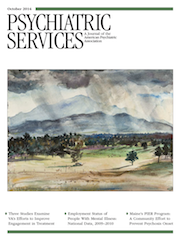Mental Health Service Use Among African-American Emerging Adults, by Provider Type and Recency of Use
Abstract
Objective
This study examined factors associated with mental health service utilization among African-American emerging adults, specifically, when services were used (recency) and the types of providers visited (mental health versus non–mental health).
Methods
Guided by the behavioral model for vulnerable populations, secondary analysis of responses to the National Survey of American Life (2001–2003) was conducted. A nationally representative sample of African-American emerging adults, ages 18–29 (N=806), were assessed with the Composite International Diagnostic Interview. “Evaluated need” was determined by endorsement of mood, anxiety, substance use, or impulse control diagnoses. Respondents who reported a need for services for emotional or substance use problems were considered to have a “perceived need.” Those who reported voluntary use of mental health or general medical services to address these problems were considered to have utilized services.
Results
Twenty-five percent of the sample utilized services in their lifetime, whereas 9% utilized services in the past 12 months. Females were more likely than males to utilize services in three of the four service use categories (lifetime, mental health sector, and non–mental health sector). Respondents with an evaluated need for services were two to 12 times more likely to have used services compared with those without a need for them.
Conclusions
Little is known about why African-American emerging adults underutilize mental health services. Being female and having an evaluated need for services were associated with greater odds of service use, which would suggest the need for additional examination of gender differences in service utilization and greater mental health outreach and education among African-American males.



